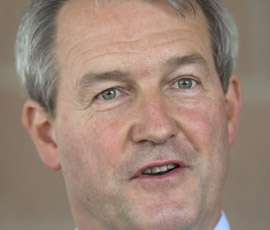DEFRA pledges straightforward CAP reform

Industry leaders and the government have issued a joint statement pledging “no surprises” for farmers in the implementation of CAP reform.
The joint statement was agreed by DEFRA, the NFU, the Tenant Farmers Association and the Country Land and Business Association (CLA).
It was issued to coincide with the CLA Game Fair, held at the Ragley Hall estate, Warwickshire, on Friday (19 July).
DEFRA secretary Owen Paterson, NFU president Peter Kendall and CLA president Harry Cotterell are all attending the event.
DEFRA and the NFU have been at loggerheads for months over government plans to use last month’s CAP reform agreement to transfer 15% of direct farm payments to rural development measures.
Mr Kendall has warned that doing so would put English farmers at a disadvantage to other European growers and livestock producers.
But Mr Paterson argues that transferring the money gives taxpayers better value and encourages farmers to deliver public goods, including environmental measures.
Mr Kendall has also voiced concern that Mr Paterson could use flexibility within the CAP reform agreement to ratchet up greening requirements for farmers in England.
“The end result must also be as simple, effective and affordable as possible and keep the bureaucratic burden on farmers and small businesses to a minimum.”
Owen Paterson, DEFRA secretary
But Mr Paterson has denied this, insisting that he wants CAP reform implementation to be as simple as possible for the government and farmers.
The statement is the first sign that both sides are keen to ease tensions and find common ground.
“There are still some key stages left to go in the EU negotiations on the CAP but June marked a major milestone in the main EU negotiations on CAP reform,” the statement says.
“The focus now needs to be on implementation.”
“There are choices in how we do this, in particular regarding implementation of the new direct payments scheme, how ‘greening’ will be delivered; what the Rural Development Programme should include to achieve its aims; what that will cost and how that cost is funded.
“We want to implement in ways that enhance farmers’ competitiveness, the rural economy and the environment, as well as delivering best value for taxpayers and consumers.
“The end result must also be as simple, effective and affordable as possible and keep the bureaucratic burden on farmers and small businesses to a minimum.
“We have learned the lessons of the over-complex implementation in 2005.
“We want this CAP implementation to be a model of the partnership approach set out by the Farming Regulation Task Force – that means openness and no surprises.”
“With that in mind and looking at the CAP as a whole, we need to look carefully at what we want to achieve and how we deliver that.
“We are committed to working closely together and with all interested groups on this over the coming weeks and months.”
English farm leaders fear CAP reform is raw deal
See more news on CAP reform
